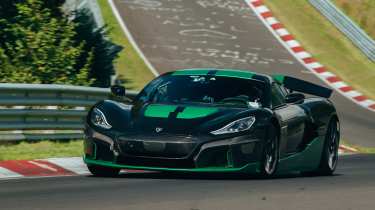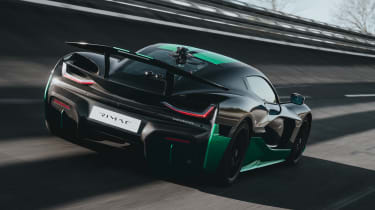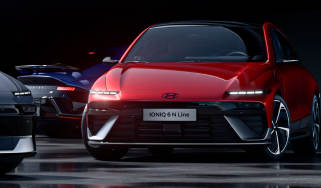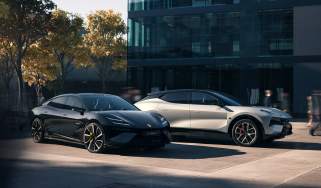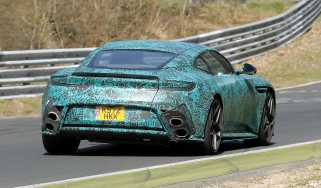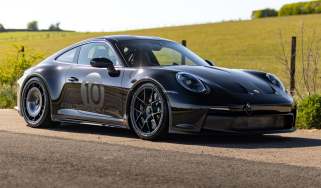Rimac Nevera shatters Nürburgring EV lap record
The astonishing Rimac Nevera has beaten the Tesla Model S Plaid by 20sec to become world's fastest production electric car around the Nürburgring
The Rimac Nevera has already proven to be gut-wrenchingly rapid in a straight line, but we now have the clearest picture yet of just how capable it is on a circuit. The 1887bhp hypercar took to the Nürburgring this month to post a rapid 7:05.293 lap time, breaking the EV record previously held by the Tesla Model S Plaid Track Package.
The lap was set by Croatian racing driver Martin Kodrić using road-legal Michelin Cup 2R tyres, and verified by independent timing data. The Nevera cut 20sec from the Tesla's time, but given its colossal power output and four-wheel torque vectoring, it's a little surprising that it didn't get closer to the outright production car lap record: a 6:35.183 set by the 1048bhp Mercedes-AMG One.
Nevertheless, the Nevera is one of the fastest road cars on the planet, affirmed by an incredible series of GPS-verified performance figures released earlier this year. With a top speed of 258mph it's the fastest production EV, and achieves a 0-249-0mph time of just 29.93sec.
With a one-foot rollout on un-prepped asphalt, the Nevera sprints to 62mph from standstill in a scarcely believable 1.81sec, going on to reach 124mph in 4.42sec and 186mph in 9.22sec. The Nevera is delivered to customers with a limited top speed of 219mph, but Rimac can lift this to the full 258mph at special customer events under controlled conditions, primarily to ensure optimal tyre condition for such high speeds.
The Nevera itself is based on the Concept_Two first unveiled in 2018, but now Rimac has taken that car’s bespoke chassis, motors and batteries and turned them into something tangible that customers can actually purchase. The numbers are predictably immense, including the price, which is £1.72million, plus taxes.
Rimac Nevera: technical details
Peak power is rated at a cool 1887bhp and torque at 1741lb ft, generated from four individual ‘Permanent Magnet’ motors in modules that sit on each axle. The two axles are driven from individual single-speed transmissions, but power is still fully variable left-to-right. The motors draw power from a 120kWh (gross) lithium-ion battery pack that sits in a T-shaped module between and behind the two seats. Range is predicted to be around the 340-mile mark, and no indication of weight has been revealed.
The Nevera’s construction is derived from a central carbonfibre monocoque tub, with aluminium subframes bolted at each end to which the axles are mounted. The battery pack also forms a structural part of the carbon tub itself, adding 37 per cent extra stiffness to the torsional rigidity rating. Suspension is of a double wishbone design at all four corners, with adaptive dampers and an adjustable ride height giving the Nevera increased adjustability within the driver mode systems.
Like most EVs, braking is dealt with by two systems, with Rimac’s 300kW regeneration capability being the most powerful of any production EV, backed up by a 390mm set of carbon-ceramics discs and six-piston calipers from Brembo. The braking system is entirely by-wire, with a feedback motor built into the hardware designed to merge brake feel from the two systems into one linear response. The steering is also completely by-wire.
The Nevera’s type of total torque vectoring has also given engineers the chance to rethink traditional traction control and stability programs, essentially replacing those systems (which cut power and utilise friction brakes) with a predictive and reactive traction management system using the electric motors entirely independently of one another. The new system is called ‘Rimac All Wheel Torque Vectoring 2’ (R-AWTV 2) and specifically calibrates the amount of torque being sent to each wheel according to conditions, driver inputs and the selected driver mode, to get the most from each of the four motors and keep the car stable whilst doing so.
While the exterior design does look similar to that of the concept, Rimac has completed a large amount of aero refinement to clean up the shape, while also improving downforce values that are augmented by its active aerodynamic components. These include a moveable grille insert, flaps under the splitter and in the rear diffuser, plus a moveable rear wing. All these operate independently depending on the selected driver mode. Total downforce variation between its highest and lowest settings is a substantial 326 per cent.
Inside, the cabin is typically heavy on digital interfaces, with three displays incorporated into an otherwise restrained yet infinitely customisable interior. In fact, Rimac is adamant that no two Neveras will leave the factory the same, offering three starting specifications as well as a completely bespoke palette of colours.
While all of the car’s on-paper numbers sound exciting, the real thrill with the Rimac Nevera is that it is a far more tangible electric hypercar than just about any other in development right now. That enthusiasm has spread to the traditional OEMs too, with confidence in Rimac’s technology so strong that Porsche has purchased a ten per cent share in the company, while Hyundai Kia has also invested £70million. This is evidence that more than simply being a manufacturer of electric supercars, Rimac looks set to become a very important part of the performance car landscape and the industry’s transition to electrification.
As a final note, the name ‘Nevera’ comes from a word for a storm surge that can hit the Croatian coast from the Adriatic Sea – with Italy just on the other side. While Rimac still has a way to go before it becomes a household name alongside more traditional supercar royalty, there’s certainly some level of irony considering the storm this modern supercar maker is stirring up.

